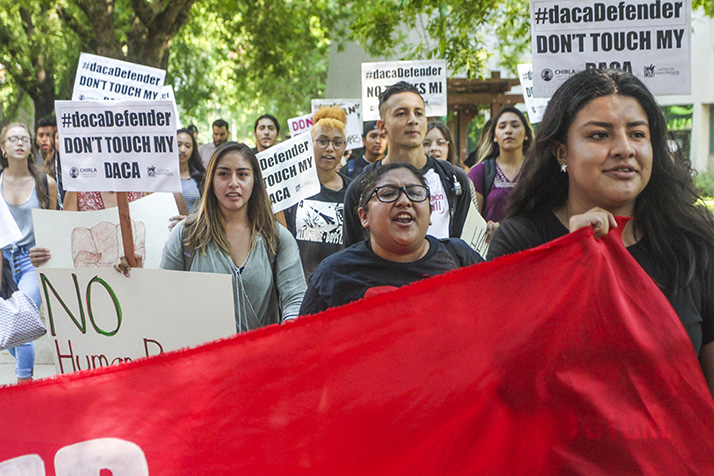GALLERY: Sac State activists protest DACA decision
Multiple protests were quickly organized after the Trump administration formally announced their plans to end DACA programs Tuesday morning
Claire Morgan – The State Hornet
Rosa Barrientos leads a chant while walking with a group of protesters around Sacramento State. The protest was one of multiple which happened in response to the Trump administration’s decision to end the Deferred Action for Childhood Arrivals (DACA) programs on Tuesday.
(Click through slide show for more photos from the event)
[su_carousel source=”media: 36168,36123,36118,36114,36113,36110,36108″ limit=”98″ width=”1400″ height=”1000″ items=”1″ autoplay=”0″ speed=”400″][su_carousel source=”media: 36168,36123,36121,36118,36113,36110,36109,36108″ limit=”98″ width=”1400″ height=”1000″ items=”1″ title=”no” autoplay=”0″ speed=”400″][su_carousel source=”media: 34486,34485,34484,34483,34482,34481,34480,34478,34477″ limit=”98″ width=”1280″ height=”720″ items=”1″ autoplay=”0″ speed=”400″ title=”yes”]”[/su_carousel]
The Trump administration formally announced its plans to end the Deferred Action for Childhood Arrivals (DACA) program early Tuesday morning, which inspired protests on and off campus led by a group of Sac State students.
DACA provides amnesty on a renewable two-year basis for more than 800,000 undocumented immigrants. California has over 200,000 DACA recipients, which is more recipients than any other state in the country, according to the latest US Citizen and Immigration Services report.
(Follow Claire Morgan and Joseph Daniels on Twitter for even more tweets from Tuesday protests.)
Students chant “up, with education, down with deportation” as a crowd gathers pic.twitter.com/ynSvxLIyxY
— Claire Morgan (@jemapelleclaire) September 5, 2017
The group is headed back to the library quad now. pic.twitter.com/6On5cDotIq
— Claire Morgan (@jemapelleclaire) September 5, 2017
A group of people are protesting the DACA decision at the US Immigration & Customs field office in Sacramento pic.twitter.com/smL2itLMs7
— Claire Morgan (@jemapelleclaire) September 6, 2017
@PrezNelsen is here chanting with protesters pic.twitter.com/pAPXIbdPRT
— Claire Morgan (@jemapelleclaire) September 6, 2017
The Department of Homeland Security will stop reviewing applications for the program as of Tuesday, but will allow current holders to renew their statuses for the next six months to allow Congress to deliberate if the program will be continued, and to what capacity.
To be eligible for DACA, applicants must have arrived in the United States before the age of 16, and have lived there since June 15, 2007. Additionally, applicants must have been younger than 30 when the US Department of Homeland Security introduced the program in 2012.
Sacramento State had 65 DACA holders last spring according to Elisa Smith, the previous communications director for Sac State.
“That includes those on F-1 visas (they are seeking a degree) and permanent residents (they have green cards),” Smith said in an email to The State Hornet in January.
Craig Koscho, the acting news director for the university’s public affairs and reporting office, said that there are around 1,000 undocumented students who attend Sac State.
Led by Rosa Barrientos and other members of Students for Quality Education, students chanted and spoke in favor of DACA programs before marching around the north end of campus.
“Now more than ever, we need to stand with them and show the undocumented students that they have a family and that they have allies that are willing to stand with them during their times of need,” Barrientos said during the demonstration.
Jorge Quintana helped Barrientos organize the protests, and said that it was important for students to help each other when faced with adversity.
“We want to show the Sac State community that we’re vocal about these issues,” Quintana said. “Today it’s undocumented students, but tomorrow it could be black students, Muslim students. We want people to show solidarity.”
Barrientos, Quintana and a few other students who work with the California Dream Network helped to organize another protest off campus, in front of the US Customs and Immigration Services field office on Capitol Mall.
Martha Ancajas, a DACA recipient and Sac State student, attended the protest and said that she felt as if the dialogue was a positive part of an otherwise disappointing situation. Ancajas said the decision “breaks my heart,” but felt empowered by the resistance showed at the protests.
“It just gives me hope to keep organizing, to keep fighting as a dreamer, as an activist,” Ancajas said.
Nelsen urged members of the campus community to support and protect undocumented students, citing the decision to remove DACA programs as a “political statement.”
Kagianas’s message echoed Nelsen’s, as well as promising to advocate for DACA recipients on campus.
“Regardless of the fate of the DACA program, Associated Students Inc. is committed to supporting, empowering, and advocating for the rights and needs of our students,” read the Sac Send sent by Kagianas. “In collaboration with the University President’s Office and the Dreamer’s Resource Center, Associated Students Inc. is prepared to support students who are impacted by the outcome of the program.”
Sac State President Robert Nelsen attended the afternoon protest, chanting along with the crowd on the same day he and ASI president Mia Kagianas sent out statements on the issue to the Sac State community.
Additional reporting by Joseph Daniels
RELATED:
Your donation will support the student journalists of Sacramento State University. Your contribution will allow us to purchase equipment and cover our annual website hosting costs.































































































































PeanutRoaster • Mar 9, 2018 at 12:06 am
>>>“Today it’s undocumented students, but tomorrow it could be black students, Muslim students. >>>>
Don’t be stupid. Tomorrow it will be straight white males.